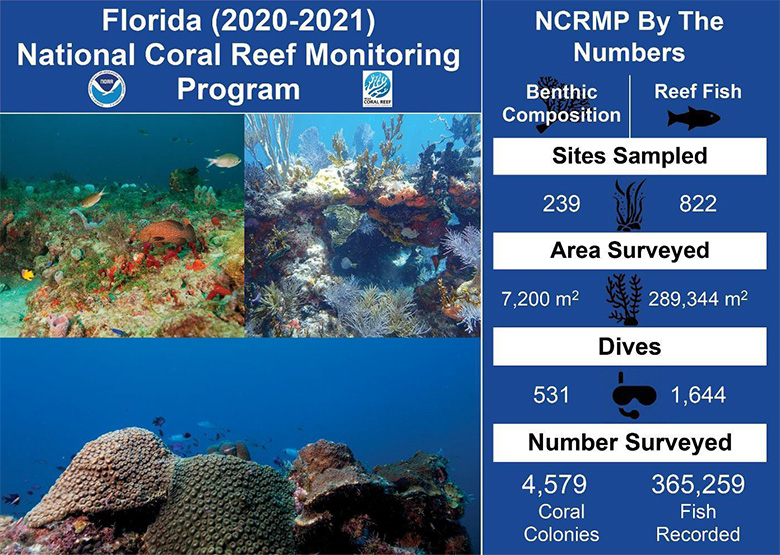
Summary statistics for the 2020-2021 sampling completed in Florida.
A report released in October 2022 describes the status and trends of Florida's coral reef ecosystem using data from the National Coral Reef Monitoring Program (NCRMP). The technical report and web story summarizes 2020-2021 surveys in Florida for fish, corals and benthic communities along the Florida coral reef tract, from Southeast Florida, the Florida Keys, and the Dry Tortugas.
This National Coral Reef Monitoring Program (NCRMP) biological team report is a collaboration between the NOAA Coral Reef Conservation Program, NOAA Fisheries - Southeast Fisheries Science Center, and NCCOS. NOAA NCRMP conducts biological sampling for benthic communities (corals and algae) and fish populations in Florida every other year, and typically in even-numbered years. Due to the coronavirus pandemic, a protracted sampling occurred in both 2020 and 2021. In both years, NCRMP surveys occurred throughout summer and fall months in shallow-water (0–30 m) coral reef areas. NCRMP data are used to inform coral and fish population management strategies, document the occurrence of endangered species and coral disease, and assist with local monitoring efforts.
Key messages from this report are:
- The fishery target species with the highest mean density varied by region from yellowtail snapper (Ocyurus chrysurus) in the Dry Tortugas to gray triggerfish (Balistes capriscus) in Southeast Florida.
- Reefs in all locations were dominated by fishery non-targeted species including masked goby (Coryphopterus personatus), bicolor damselfish (Stegastes partitus), and bluehead wrasse (Thalassoma bifasciatum).
- Stony Coral Tissue Loss Disease was first reported in the Dry Tortugas in July 2021. Coral cover continues to decline in all Florida regions.
Information about NCRMP’s methods, data, and data projects are available on the project website.
 Official websites use .gov
A .gov website belongs to an official government organization in the United States.
Official websites use .gov
A .gov website belongs to an official government organization in the United States. Secure .gov websites use HTTPS
A lock or https:// means you’ve safely connected to the .gov website. Share sensitive information only on official, secure websites.
Secure .gov websites use HTTPS
A lock or https:// means you’ve safely connected to the .gov website. Share sensitive information only on official, secure websites.